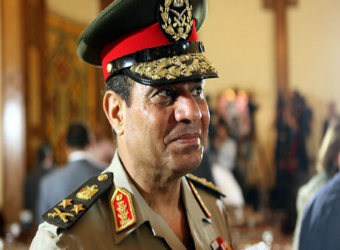The seemingly imminent release of Hosni Mubarak, the emblematic toppled tyrant of the unfortunately titled Arab Spring, summarises and symbolises the sense of counter-revolution triggered by last month’s coup d’état against President Mohamed Morsi, and the subsequent massacres of his Muslim Brotherhood supporters.
Already the army-backed government has revived essential elements of the Mubarak-era secret police, put generals back in charge of provincial government and reinstated martial law. The scenography of restoration is completed by the humiliating arrest of Mohamed Badie, the supreme spiritual guide of the Brotherhood – something Mr Mubarak never did.
General Abdel Fattah al-Sisi, Egypt’s army chief, seems intent on extirpating the Brotherhood, an 85-year-old movement that commands the loyalty of a quarter of the populace, and won five votes since Mr Mubarak was brought down by popular revolt in 2011.
In this, the general has the full-throated support of King Abdullah of Saudi Arabia and his Gulf allies, thrilled he has moved against the threats they most fear and loathe: democracy and the rival brand of Islam purveyed by the Brothers. Within hours of the coup they stumped up $12bn in emergency funding for the interim authorities. Now the Saudi king warns “outsiders” he will not stint in supporting Gen Sisi’s drive against the fitna – sedition and societal dissolution – of the “terrorists”.
So, has the region moved from the so-called Arab Spring to the Arab edition of the “war on terror”, complete with “you’re either with us or against us” threats?
To Egypt’s west in Tunisia, attempts to negotiate a reset for inclusive transition between secularists and Islamists hang by a thread. Next door, Libya sometimes resembles an arms bazaar run by tribal warlords. To Egypt’s east, Syria is mired in a civil war that Bashar al-Assad – a new admirer of Gen Sisi – has helped spread into Iraq and Lebanon by violent and sectarian attacks on his people.
Common to all these countries are two things: a poverty of institutions (from none in Libya, except the tribes, to the army as principal institution in Egypt); and a winner-takes-all culture of zero-sum politics, common both to the old order and its Islamist challengers. Disorganised secular and liberal forces have either been buffeted between them or, as in Egypt now, mostly sided with the army as the seemingly lesser evil.
But that is hardly the end of what is merely the beginning of a long transition in Arab political culture. The Arab Spring was a phrase aimed at those, abroad as much as within Arab countries in effervescence, who need instant political gratification and neat pigeon-holing; the better if inadequate revival of the term Arab Awakening at least reconnected with a process that began in the 19th century – giving some sense of both timescale and historical process. It was always delusional to see this as a matter of seasons rather than the work of a generation.
It was, perhaps, inevitable people would be mesmerised by the sudden protagonism of digitally-fuelled youth in these upheavals, and too inattentive to the main historic protagonists in the Arab drama: generals against Islamic revivalists, men on horseback versus men in turbans, fighting for economic as well as political market share.
But the sheer numbers of Arab youth, between half and two-thirds of most populations, suggest recycled men of destiny like Gen Sisi or, for that matter, the Assad despotism that so dimly reproduces the past in everything except its thirst for blood, have limited shelf life.
Liberals and leftists, nationalists and secular youth, as well as younger Islamists chastened into a more inclusive democratic culture, will sooner or later see through the sham prospectus of secular benevolent despotism – especially when bankrolled by absolute monarchies and Wahhabi absolutism from the Gulf. The old order manufactured Islamists as its mirror image. The problem cannot be the solution.
It is already apparent that restoring the security state is not the same as re-establishing security; the torched churches of the Nile valley are witness to it. As the focus in Egypt shifts to setting constitutional rules and establishing the rule of law, will the generals, for example, seek to amend those bits of Mr Morsi’s sectarian constitution that ringfence and extend their powers? It will not take long for the military halo to slip.
Source: The Financial Times



